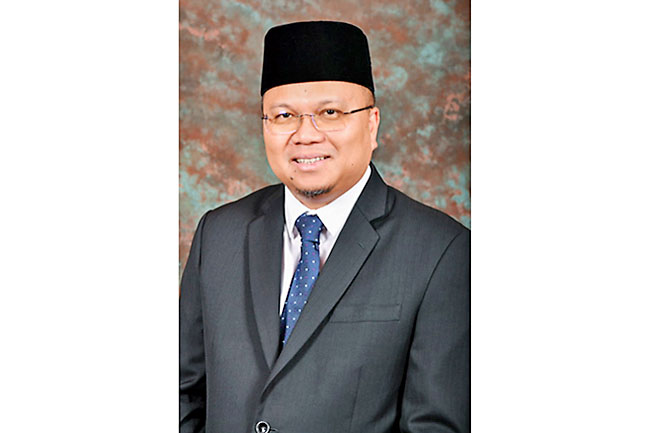Azlan Othman
The number of kidney patients is increasing yearly. According to statistics from the Department of Renal Services, Ministry of Health (MoH) at the end of last year, 3,000 patients under the care of the Chronic Kidney Disease Clinic were at a ‘serious’ level across the four districts. This does not include the 881 patients with end-stage renal disease, requiring kidney replacement therapy treatment.
This was highlighted by Minister of Health Dato Seri Setia Dr Haji Mohd Isham bin Haji Jaafar in a message to mark World Kidney Day 2021.
“One in 10 people worldwide suffer from chronic kidney disease, meaning an estimated 10 per cent (or 40,000 people) of the Sultanate’s total population suffers from chronic kidney disease.
“Brunei Darussalam is no exception, and is among the countries with the highest rate of end-stage kidney disease in the world. The main causes of kidney disease in Brunei Darussalam are diabetes and high blood pressure.
“When the kidneys fail to function properly, waste products normally excreted from the body through urine will remain in the blood causing loss of appetite, nausea, vomiting, fatigue and weakness of the body. When this happens, the patient has only two options; either undergoing dialysis treatment or a kidney transplant. If left untreated, it can lead to death,” he said.
Dato Seri Setia Dr Haji Mohd Isham added, “Every year, on Thursday in the second week of March, the whole world celebrates World Kidney Day as a health awareness campaign to raise public awareness on kidney disease and its effects.


“This year’s celebration themed ‘Living Well with Kidney Disease’ aims to bring hope and motivation to kidney patients. It also encourages patients to adopt a healthier life and manage symptoms effectively.
“Kidney disease is a non-communicable disease (NCD). Kidney patients often face great challenges in leading a normal lifestyle and performing daily activities. This condition is due to the changes that occur due to the disease and the treatment that needs to be carried out.
“The changes experienced include four main aspects – namely, emotional aspects such as anger and depression; physical aspects such as sudden weight loss, slightly blackish skin and itching; social aspects such as lack of self-confidence, despair and constant feeling of tiredness; and socioeconomic aspects such as not being able to hold a job due to the emotional, physical and social aspects.
“This will certainly have a major impact on the lifestyle and quality of life of the patients. These changes will also have an impact on those around them, including their family, friends and the community.
“Kidney replacement therapy is divided into peritoneal dialysis treatment (water wash), haemodialysis treatment (blood wash) and kidney transplant treatment. The Brunei Darussalam Dialysis Transplant Registry 2020 showed that 85 per cent of patients choose haemodialysis treatment.”
The minister said, “In 2014, Brunei Darussalam introduced a peritoneal dialysis preference policy (PD-preference policy) on the basis of improving quality of life and superior continuity of short-term survival with better peritoneal dialysis.
“Several reviews of international studies show home dialysis therapies such as peritioneal dialysis have been consistently found to have shown improving the autonomy, flexibility and quality of life of kidney patients.
“Patients can undergo peritoneal dialysis treatment comfortably at home and do not have to go to a haemodialysis centre for treatment which often has a limited treatment schedule.
“In this way, patients have more flexibility in adapting (in terms of dialysis treatment) to their lifestyle in undergoing dialysis treatment, painlessly and without the use of needles. More importantly, treatment hours do not interfere with their working hours and do not have to involve family members sending and accompanying them to the treatment centre,” he said.
“The Department of Renal Services will conduct activities throughout the year to promote chronic kidney disease and prevention awareness, as well as to attract patients to choose peritoneal dialysis treatment as the main option. They will include workshops, symposiumd and health promotion activities that are peritoneal dialysis-oriented.
“Brunei has six haemodialysis treatment centres/units across all four districts, located at Raja Isteri Pengiran Anak Saleha (RIPAS)Hospital, Kiarong Dialysis Centre, Rimba Dialysis Centre, Temburong Dialysis Unit, Kuala Belait Dialysis Centre and Tutong Dialysis Centre.
“This month will see the introduction of the Renal Dialysis Unit at Jerudong Park Medical Centre (JPMC). The JPMC Renal Dialysis Unit, a collaboration between the MoH through the publicprivate partnership project, will be the first dialysis centre in the country to be privatised.
“This privatisation will reduce the burden on the government, in terms of building a new dialysis centre and its maintenance cost, as well as providing assistance services and staff recruitment.
“Privatisation is an alternative method chosen by several countries such as Malaysia, Hong Kong, Saudi Arabia as well as European countries and the United States (US) in the effort to improve the quality of health services to the public, increase accountability and at the same time reduce government dependency.
“This new dialysis unit will reduce the number of patients undergoing dialysis treatment from night to dawn at RIPAS Hospital.
“The JPMC Renal Dialysis Unit can offer treatment services to at least 102 patients.
“We are very fortunate in Brunei Darussalam because health services can be accessed by all citizens and residents in this country. In addition, treatment and medicine are given for free. However, it is our responsibility to work together to adopt a healthy, active lifestyle and follow a healthy, balanced diet with effective medicine.
“With the celebration of World Kidney Day, God willing, there will be more people who understand kidney disease, including patients, caregivers, family members of patients who will be able to help reduce burdens and symptoms associated with kidney disease so that all can enjoy a healthy and prosperous life, in line with Brunei Vision 2035,” the minister said.